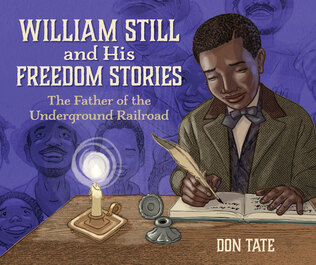BY AMINA CHAUDHRI AND MARY ANN CAPPIELLO, ON BEHALF OF THE BIOGRAPHY CLEARINGHOUSE “William Still’s records, and the stories he preserved, reunited families torn apart by slavery. Because that’s what stories can do. Protest injustice. Sooth. Teach. Inspire. Connect. Stories save lives.” - Don Tate, from William Still and His Freedom Stories: The Father of the Underground Railroad  As 2021 begins, we want to acknowledge the continued need to show young people that Black Lives Matter. Part of that responsibility is shifting our curriculum away from a white-centered view of U.S. history and towards a more multifaceted exploration of all of the communities that have lived on this land from prehistory to today. Don Tate’s picturebook biography William Still and His Freedom Stories: The Father of the Underground Railroad, this month’s featured text on The Biography Clearinghouse, is an important text to help make this change in elementary and middle school classrooms. William Still and his Freedom Stories is one of several recent publications that highlights the role of African Americans in the freedom struggle, countering the narrative that freedom from slavery depended on the actions of whites. A precise, linear narrative takes readers through significant events that shaped William Still’s understanding of the world and his role in making it better for African Americans. Readers follow Still from childhood to adulthood, bearing witness to his desire to learn, the grueling labor he endured to earn a living, and eventually, the risks he took to secure freedom for enslaved people and his post-Civil War activism to fight segregation. This deeply-researched and powerfully-illustrated book has layers of curricular potential: as a read aloud, as a mentor text for literacy skill development, as a model of the genre of biography, as an important piece of history, and much more. Operating within the Investigate, Explore, and Create Model of the Biography Clearinghouse, we designed teaching ideas geared toward literacy and content area learning as well as opportunities for socio-emotional learning and strengthening community connections using William Still and His Freedom Stories. Featured here are two teaching ideas inspired by William Still and His Freedom Stories. The first engages students deeply with the text itself - its form and content, and the second extends learning beyond this picturebook to explore multiple sources for inquiry and research.
Advocating for and Learning from 19th Century Black-Authored Texts For far too long, too many students in the U.S. have been taught a white-centered modern history that avoids a close examination of imperialism and the legacy of Europe’s colonial reach. The brutal history of the global slave trade of the 17th - 19th centuries has been marginalized as have the many stories of Black agency, resistance, and liberation. As a consequence, young people - and many adults - have limited knowledge of that history. We need this to change. William Still and His Freedom Stories is one text that helps to make that change. In this teaching idea for middle school students, we leverage the conversations that this book can open with more in-depth research writings of 19th century activists such as William Still and 19th century Black journalists.
Amina Chaudhri is an Associate Professor of Teacher Education at Northeastern Illinois University. She is a reviewer for Booklist and a regular contributor to Book Links. Mary Ann Cappiello teaches courses in children’s literature and literacy methods at Lesley University, blogs about teaching with children’s literature at The Classroom Bookshelf, a School Library Journal blog, and is a former chair of NCTE’s Orbis Pictus Award for Outstanding Nonfiction K-8. Comments are closed.
|
Authors:
|
CLA
About CLA
|
Journal of Children's Literature
Write for JCL
|
ResourcesCLA-sponsored NCTE Position Statements
|
Members-Only Content
CLA Video Library
|
© COPYRIGHT 2018.
ALL RIGHTS RESERVED |

 RSS Feed
RSS Feed